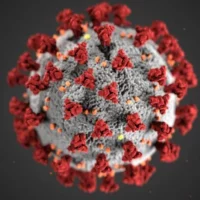Lung cancer has long stood as one of the most formidable challenges in medicine—claiming more lives each year than any other cancer and often leaving patients with limited treatment options and grim prognoses. Despite advances in surgery, radiotherapy, and immunotherapy, survival rates for advanced cases remain alarmingly low, and recurrence is a persistent threat. But a groundbreaking clinical trial now underway in seven countries offers a new source of hope: the world’s first mRNA vaccine designed specifically to treat non-small cell lung cancer (NSCLC), the most common form of the disease.
Developed by BioNTech, the same company behind one of the earliest and most effective COVID-19 vaccines, this experimental treatment—known as BNT116—uses messenger RNA technology to prime the body’s immune system to recognize and destroy cancer cells. If successful, it could mark a paradigm shift in cancer care: one where treatment becomes more precise, immune-based, and potentially preventative. The vaccine is currently being tested in a Phase 1 trial involving about 130 patients across a range of clinical stages, offering a rare opportunity to explore how this innovative approach performs in real-world conditions.

A New Frontier in Lung Cancer Treatment – The Promise of mRNA Vaccines
Lung cancer is the leading cause of cancer-related death worldwide, responsible for an estimated 1.8 million deaths each year. Despite decades of progress in oncology, survival rates for those diagnosed with advanced or metastatic lung cancer remain dishearteningly low. The most common form, non-small cell lung cancer (NSCLC), is particularly difficult to treat in its later stages, with high rates of recurrence even after surgery or radiation. Against this sobering backdrop, the launch of the world’s first clinical trial for an mRNA-based lung cancer vaccine represents a significant milestone. For patients and researchers alike, it signals a potential turning point in the fight against one of the most stubborn and lethal forms of cancer.
The vaccine, known as BNT116, is being developed by BioNTech, the German biotechnology firm widely recognized for co-developing one of the first COVID-19 mRNA vaccines with Pfizer. BNT116 uses a similar approach: it delivers strands of messenger RNA that teach the immune system to recognize tumor-specific antigens found in NSCLC cells. Once primed, the immune system is expected to identify, target, and destroy cancer cells bearing these markers—while sparing healthy tissue. This method contrasts sharply with traditional cancer therapies like chemotherapy, which often attack both malignant and healthy cells, leading to widespread side effects and weakened immunity. By harnessing the body’s own defense mechanisms, BNT116 could offer a more precise, tolerable, and ultimately more effective way to treat lung cancer.
The Phase 1 clinical trial, which marks the first time this vaccine is being tested in humans, is currently underway across 34 research centers in seven countries: the United Kingdom, United States, Germany, Hungary, Poland, Spain, and Turkey. Around 130 patients will be enrolled across the trial’s global network, with approximately 20 of those participating in the UK alone. Participants include individuals at various stages of NSCLC—from early-stage cases undergoing treatment before surgery or radiotherapy to those facing advanced or recurrent disease. The trial will evaluate the vaccine’s safety and immunogenicity when administered in combination with existing immunotherapies, offering a potential boost to current standard-of-care treatments.
At the forefront of the UK’s participation is University College London Hospitals NHS Foundation Trust (UCLH), which is leading the trial at six sites across England and Wales. Professor Siow Ming Lee, a consultant medical oncologist at UCLH and one of the trial’s principal investigators, emphasized the potential of this new approach. “We are now entering this very exciting new era of mRNA-based immunotherapy clinical trials to investigate the treatment of lung cancer,” he said. “It’s simple to deliver, and you can select specific antigens in the cancer cell, and then you target them. This technology is the next big phase of cancer treatment.”
Among the first to receive the vaccine is Janusz Racz, a 67-year-old scientist specializing in artificial intelligence who was diagnosed with lung cancer in May. Racz received his first dose at the National Institute for Health Research UCLH Clinical Research Facility, where he underwent a sequence of six injections spaced five minutes apart, each containing different RNA strands. He will continue receiving the vaccine weekly for six weeks, followed by maintenance doses every three weeks for over a year. Motivated by both personal health and scientific advancement, Racz shared, “I am a scientist too, and I understand that the progress of science – especially in medicine – lies in people agreeing to be involved in such investigations. It’s a new methodology not available for other patients that can help me get rid of the cancer.”

How mRNA Technology Is Revolutionizing Cancer Therapy
Messenger RNA, or mRNA, burst into public consciousness during the COVID-19 pandemic as the foundation for some of the most effective and rapidly deployed vaccines in history. But long before the world relied on it to curb a global health crisis, researchers had been exploring mRNA’s potential in oncology. Now, with the launch of trials like BNT116, we are witnessing that early research evolve into a potentially transformative therapeutic strategy against cancer.
The core principle behind mRNA vaccines is elegant in its simplicity: deliver synthetic instructions to the body’s cells, prompting them to produce specific proteins—known as antigens—that the immune system can recognize and attack. In infectious diseases, these antigens mimic parts of a virus; in cancer, they represent molecules expressed on the surface of tumor cells. By training the immune system to recognize these tumor-associated antigens, an mRNA cancer vaccine like BNT116 can mobilize T cells to hunt down and eliminate cancer cells displaying these markers.
This precision is what makes mRNA particularly promising in oncology. Unlike chemotherapy, which acts as a blunt instrument by killing rapidly dividing cells indiscriminately, mRNA-based immunotherapies can be tailored to target only malignant cells. This means fewer off-target effects, less toxicity, and a reduced likelihood of damaging healthy tissue. Moreover, mRNA can be rapidly designed and updated as needed—an adaptability that is especially crucial for cancers like NSCLC, which often mutate and evolve resistance to treatment over time.
The BNT116 vaccine delivers multiple RNA strands encoding several tumor-associated antigens specific to NSCLC. This multi-target approach increases the likelihood that the immune system will recognize and respond to the tumor, even as it changes. These antigens are carefully selected based on extensive genomic profiling of NSCLC tumors, ensuring the vaccine’s relevance to a broad patient population. Once introduced into the body, the RNA strands are taken up by cells, which then produce the antigens, effectively flagging the cancer to the immune system in a way it had previously failed to detect.
Crucially, this immunological strategy is designed not only to attack existing cancer cells but also to establish long-term immune memory—helping to prevent the cancer from returning. This aspect is particularly important in lung cancer, where recurrence is a persistent and often fatal issue. “We hope adding this additional treatment will stop the cancer coming back,” said Professor Lee. “A lot of time for lung cancer patients, even after surgery and radiation, it does come back.”

Inside the Clinical Trial – Structure, Goals, and the Patient Experience
The launch of the BNT116 trial marks an important step in what could become a pivotal advancement in lung cancer treatment. Though still in its earliest clinical phase, the trial is carefully designed to evaluate key aspects of the vaccine’s performance, including safety, tolerability, immune response, and potential signals of clinical efficacy. These early findings will be crucial for determining whether the vaccine can move forward to larger, more definitive trials in the years ahead.
This Phase 1 trial is being conducted across 34 clinical sites in seven countries: the United Kingdom, United States, Germany, Hungary, Poland, Spain, and Turkey. It aims to enroll around 130 participants, all of whom have been diagnosed with non-small cell lung cancer (NSCLC) at various stages—ranging from those receiving treatment before surgery or radiotherapy to those with more advanced or recurrent disease. This diverse patient pool will allow researchers to observe how the vaccine performs across different clinical contexts and stages of disease progression.
Each participant receives the vaccine in combination with standard immunotherapy drugs, a pairing that reflects the current direction of cancer treatment strategies: rather than replacing existing therapies, promising new interventions are often layered on top to amplify their effects. This “add-on” approach is particularly relevant in immuno-oncology, where enhancing the body’s natural defenses is the central goal.
Patients like Janusz Racz, the first to receive the vaccine in the UK, exemplify the real-world significance of clinical trial participation. Diagnosed with NSCLC earlier this year, Racz began his treatment with chemotherapy and radiation. When presented with the opportunity to join the BNT116 trial, he didn’t hesitate. As a scientist himself, he understood the broader implications. “It would be very beneficial for me, because it’s a new methodology not available for other patients,” he said. “And also, I can be a part of the team that can provide proof of concept for this new methodology.” For Racz, participation was both a personal health decision and a scientific contribution.

A Glimpse Into the Future – Implications for Global Cancer Care
The BNT116 trial is not an isolated scientific experiment—it’s part of a broader movement in cancer research that is rapidly rethinking how we approach treatment. The success of mRNA vaccines during the COVID-19 pandemic demonstrated how fast and adaptable the technology can be. Now, oncology researchers are leveraging that momentum to address one of medicine’s most complex challenges: enabling the immune system to target cancer with the same precision it uses to fight infectious disease.
Globally, the interest in cancer vaccines has surged. Dozens of clinical trials are now underway for various cancers, including melanoma, colorectal, pancreatic, and breast cancer, many using the same mRNA platform. Leading biotech companies and academic institutions are investing heavily in personalized vaccine models, where tumor samples from individual patients are genetically sequenced to create a vaccine tailored to their unique cancer profile. While BNT116 is not personalized in this way, it does represent a major step forward: it delivers multiple tumor antigens commonly found in NSCLC, making it applicable to a wider range of patients and potentially scalable as a mass treatment.
Experts are cautiously optimistic. Dr. Özlem Türeci, BioNTech’s co-founder and Chief Medical Officer, has previously emphasized that the key to success in cancer vaccines lies in finding the right targets and delivering them effectively to the immune system. With BNT116, BioNTech is testing whether their technology can achieve this in a real-world clinical setting. If successful, it could validate the company’s strategy and open the door to similar vaccines for other hard-to-treat cancers.
A Glimpse Into the Future – Implications for Global Cancer Care
The BNT116 trial is not an isolated scientific experiment—it’s part of a broader movement in cancer research that is rapidly rethinking how we approach treatment. The success of mRNA vaccines during the COVID-19 pandemic demonstrated how fast and adaptable the technology can be. Now, oncology researchers are leveraging that momentum to address one of medicine’s most complex challenges: enabling the immune system to target cancer with the same precision it uses to fight infectious disease.
Globally, the interest in cancer vaccines has surged. Dozens of clinical trials are now underway for various cancers, including melanoma, colorectal, pancreatic, and breast cancer, many using the same mRNA platform. Leading biotech companies and academic institutions are investing heavily in personalized vaccine models, where tumor samples from individual patients are genetically sequenced to create a vaccine tailored to their unique cancer profile. While BNT116 is not personalized in this way, it does represent a major step forward: it delivers multiple tumor antigens commonly found in NSCLC, making it applicable to a wider range of patients and potentially scalable as a mass treatment.
Experts are cautiously optimistic. Dr. Özlem Türeci, BioNTech’s co-founder and Chief Medical Officer, has previously emphasized that the key to success in cancer vaccines lies in finding the right targets and delivering them effectively to the immune system. With BNT116, BioNTech is testing whether their technology can achieve this in a real-world clinical setting. If successful, it could validate the company’s strategy and open the door to similar vaccines for other hard-to-treat cancers.
A Glimpse Into the Future – Implications for Global Cancer Care
The BNT116 trial is not an isolated scientific experiment—it’s part of a broader movement in cancer research that is rapidly rethinking how we approach treatment. The success of mRNA vaccines during the COVID-19 pandemic demonstrated how fast and adaptable the technology can be. Now, oncology researchers are leveraging that momentum to address one of medicine’s most complex challenges: enabling the immune system to target cancer with the same precision it uses to fight infectious disease.
Globally, the interest in cancer vaccines has surged. Dozens of clinical trials are now underway for various cancers, including melanoma, colorectal, pancreatic, and breast cancer, many using the same mRNA platform. Leading biotech companies and academic institutions are investing heavily in personalized vaccine models, where tumor samples from individual patients are genetically sequenced to create a vaccine tailored to their unique cancer profile. While BNT116 is not personalized in this way, it does represent a major step forward: it delivers multiple tumor antigens commonly found in NSCLC, making it applicable to a wider range of patients and potentially scalable as a mass treatment.
Experts are cautiously optimistic. Dr. Özlem Türeci, BioNTech’s co-founder and Chief Medical Officer, has previously emphasized that the key to success in cancer vaccines lies in finding the right targets and delivering them effectively to the immune system. With BNT116, BioNTech is testing whether their technology can achieve this in a real-world clinical setting. If successful, it could validate the company’s strategy and open the door to similar vaccines for other hard-to-treat cancers.
Yet challenges remain. Cancer is a fundamentally different biological puzzle than infectious disease. Viruses like SARS-CoV-2 are foreign invaders that the immune system is built to detect and eliminate. Cancer, on the other hand, arises from the body’s own cells, often cloaked in ways that make them difficult to distinguish from healthy tissue. Tumors can also evolve rapidly, developing resistance to therapies or suppressing immune responses altogether. That’s why many in the field view mRNA vaccines as one component in a multi-pronged approach—used in combination with checkpoint inhibitors, targeted therapies, or even CAR-T cells.
From Hope to Reality – Why Cancer Innovation Demands Public Investment and Patient Participation
The emergence of BNT116 marks more than a scientific milestone—it signifies a critical juncture in the evolution of cancer care. For decades, treatment options for lung cancer have been limited to a combination of surgery, chemotherapy, radiation, and, more recently, immunotherapy. While these approaches have extended survival for some, recurrence rates remain high and side effects can be debilitating. The arrival of mRNA-based cancer vaccines offers something fundamentally different: a tailored, immune-driven therapy designed not only to treat cancer but to prevent its return. Yet for this potential to be realized, scientific innovation must be matched by systemic readiness—both in infrastructure and in public understanding.
Clinical trials such as the one for BNT116 are the foundation upon which future standards of care are built. They rely not just on scientific expertise, but on patients willing to take part—often at vulnerable and uncertain stages of their illness. People like Janusz Racz, who saw his participation as both a chance at personal recovery and a contribution to science, embody the quiet courage that drives medical progress forward. His decision to undergo a lengthy and intensive vaccine regimen underscores the dual role that trial participants play: advancing experimental medicine while navigating the very real physical and emotional toll of a cancer diagnosis. Without volunteers like him, no breakthrough—no matter how promising on paper—can ever prove its worth in practice.
But public participation and patient altruism alone are not enough. Sustained investment from governments and healthcare institutions is crucial to ensure that these therapies are not just developed, but made accessible to the people who need them most. Programs like the UK’s NHS “matchmaking” scheme, which connects eligible patients with cutting-edge trials, represent a forward-thinking approach to democratizing experimental care. Other nations will need similar models to close the gap between laboratory innovation and clinical reality. At the same time, transparency and responsible communication about what these new technologies can realistically achieve is essential to counter misinformation and maintain public trust—especially when the term “vaccine” can carry heavy emotional and political baggage.
Ultimately, the promise of BNT116 lies not only in its scientific design but in what it symbolizes: a future where cancer treatment is smarter, more personalized, and less toxic. Realizing that future will require a collective effort—of researchers and clinicians, policymakers and health systems, patients and the public. The tools for transformation are finally coming into view. What remains is the will to apply them widely, ethically, and equitably. If we can do that, we may begin to turn hope into a new standard of care, one that redefines how we live with—and eventually overcome—cancer.



